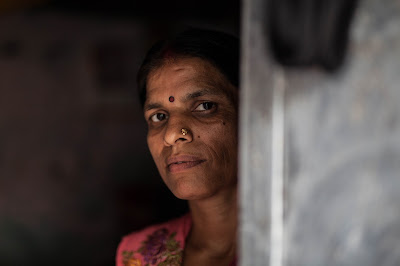16-year-old Priyanka Kumari lives with her family of six
members in Tughlaqabad village, a slum cluster that grew on a disputed land and
still continues to bear the brunt of fear and dispossession. People living here
are mostly migrants, employed in daily wage work and devoid of access to basic
necessities like clean, drinking water.
 |
| This is Priyanka Kumari |
Priyanka, her four siblings, and parents live here, in a
one-room house overlooking a makeshift bathroom. “We pay Rs 1600 plus
electricity per month for this space,” she explains. A 60-watt bulb hangs from
the corner of a dilapidated wall. Priyanka’s mother, Pratima Kumari, switches
that on whenever visitors come to her house. It is just enough to light up the
stove where she cooks. When she is at work in a nearby garment factory, the
sisters huddle together under this light to go over their lessons and
textbooks.
 |
| Priyanka's mother, Pratima Kumari. |
Pratima Kumari firmly believes in educating her daughters.
“Only education can make them independent,” she says emphatically.
She studied
till the tenth standard. After her marriage, she gave birth to three girls. “No
one values a girl in our community. They are looked down upon as a burden. Each
time I gave birth to a girl, my in-laws tortured me, reminding me of my duty to
bear a boy,” she shares. Unable to bear the torture any further, she ran away
from her in-laws house in Bihar.
She had the support of one of her uncle. He
found her a single room in Tughlaqabad’s Kamgar Mohalla with a rent of Rs. 1100
per month. “After all that he had done for me, I couldn’t ask for more help. I
stayed hungry for the first 17 days here. I managed to find work in a nearby
garment factory. I was paid Rs 1800 per month on my first job,” she recollects.
Her mother’s experience left a deep impression in the mind
of young Priyanka. Back home, she saw her father’s nonchalance towards her
mother and his conviction that it was “all her fault that the family is broken
up”. When her mother visited them after six months, she was accused of
deserting her family. “No one understood my mother’s plight. No one took her
side. Only I decided to come to Delhi with her. I was in the sixth standard
when I came to Delhi with my mother,” she says. Her father followed them after
seven months.
“It was unbearable to live with both of them under the same roof.
My father would regularly beat her up in front of me. We lived in a small
one-room house. Even if I tried to shut the images out of my mind, I couldn’t,”
she says.
Meanwhile her two younger sisters were brought up in their native
village by her maternal grandmother. It was only two years ago that the entire
family reunited in Delhi. With her father getting a job in a factory as a guard, the
monthly income has increased to Rs. 10,800 to sustain a family of six.
When Magic Bus sessions first started in the area, no one
was willing to send their daughters for it. “It is so common for girls of my
age to be teased and groped in our neighbourhood,” Priyanka shares. But when
Anurag bhaiya (local word to refer to
a Magic Bus Community Youth Leader) approached parents with a request to send
their children to the sessions, Priyanka’s mother relented.
 |
| Anurag Bhaiya speaks to Priyanka's mother. |
“On my first day, I
felt alone and nervous. I had never seen much beyond my home and neighbourhood.
In the sessions, I was supposed to interact with so many other children. As days
went by, I relaxed, made friends, and actually started to enjoy the sessions.”
Her happiness was short lived. Soon her neighbors started
gossiping about her friendship with boys of her age during the Magic Bus
sessions. “It is so unfortunate that boys and girls of my age cannot interact
with each other without raising eyebrows and questions on character and
morality. It is true that my community sees no value in bringing their girls up
to be independent, free, and confident. It is as if they want us to be mute and
demure in all that we do.” Priyanka says.
Her mother was repeatedly harassed with threats and insults
about her daughter’s character. Fed up of all the allegations, she asked
Priyanka to stop going to the Magic Bus sessions. “I struggled. I cried and
pleaded with her. I appealed to her better sense of judgement. But my mother
did not budge from her decision.”
After almost three years, Priyanka’s mother realized her
mistake. She understood that her daughters could only flourish if she supported
them in all that they wanted to do. Priyanka had leadership qualities and
always wanted to work towards the betterment of women and girls in her
community.
 |
| Priyanka with her sister |
She decided to stand by that dream and asked Priyanka to take up the
role of a Community Youth Leader.
“When Arif came home and explained what a
Magic Bus leader is, I was convinced that my eldest daughter could be one. I
also realized that my earlier decision of stopping my daughter from doing what
she really liked was actually wrong. Mothers should not cave in to societal
pressures. They should stand by and support their daughter’s dreams. I am so proud
to see Priyanka scaling new heights with each passing day.” Pratima Kumari
explains.
Priyanka’s vision is clear. “I want
my community to value women and girls and not to look down upon them, or
restrict them from following their heart. I want to resist any effort to deny
girls equal rights.” she signs off.
Help girls like Priyanka move out of poverty - Donate here.


No comments:
Post a Comment